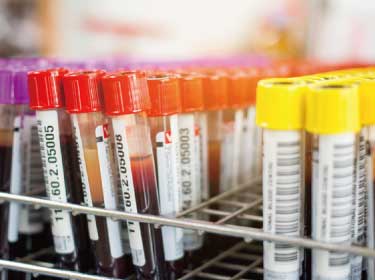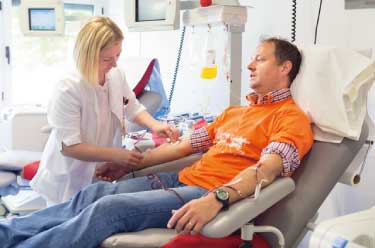Download pdf
Written by Roshini Beenukumar, PhD
Blood donors are a fitting group for recruiting healthy cohorts for large biomedical and genetic studies. A recent study published in the European Journal of Human Genetics analyzed the attitudes of blood donors towards donating samples and health data for biobanking. The study was conducted before the launch of a Finnish biobank, the Blood Service Biobank (BSB), operated as part of the Finnish Red Cross (FRC) Blood Service.
Why is a broad biobank consent from blood donors important?
Several biomedical and genetic studies, such as studies that seek to establish correlations among genotypes, environmental exposures, and risks for a variety of medical conditions, require large study cohorts that are difficult to come by.
Blood banks, which also serve as biobanks with broad consent for sample and data use, are at a unique position to solve this problem. Blood donors are seen as a suitable cohort representing healthy populations for use in such studies.

Integrating a biobank into a traditional blood bank come with several advantages:
1. Repurposed infrastructure:
There is no need to start fresh when a biobank is integrated into a traditional blood bank. Existing infrastructure for collection, handling, and storage of blood, experienced staff and an existing blood donor pool can be repurposed to advance medical research.
2. Longitudinal sample collection:
Blood donor biobanks have samples collected from the same individuals over a period of time. This allows researchers to conduct longitudinal studies that follow the same sample of people over time. This information along with genetic and health data are very useful for certain studies.
3. Donor consent:
Blood donors are generally willing to participate in biobanks and to give consent to use their sample and data for genetic research.Vera Raivola and colleagues at BSB aimed to understand what current and potential blood donors think about integrating a biobank into a traditional blood bank and their views on using their samples and data for research. In a previous study, the same research group had reported the willingness of Finnish blood donors to donate blood to scientific research, in addition to a standard blood donation. They considered it as a way to help patients and contribute to common good.
Blood donors showed a positive attitude towards joining the biobank
Many blood donors considered joining the biobank a good idea. As put by one study participant, “I think that it is a good thing; I don’t find it threatening or something that could be misused. At least I believe that it would be quite a good thing.” Combining blood donation with biobank collection to advance medical research was perceived positively by many participants. It was also seen by some as an additional opportunity to help others, as their contribution to medical research could further benefit social wellbeing. Quoting another study participant, “It (the Biobank) sounds modern, I mean good because when there is a system like that when totally new diseases appear then there is some material to at least start researching.” Frequent blood donors also considered the idea of integrating research data collection into blood collection as convenient and effective as they were already experienced in the process of donating blood and providing health information.
However, issues relating to data security and informed consent were raised by some study participants. “Isn’t it the basic right of any research participant to know where the sample goes, if one takes part?”, asks one study participant. It is, therefore, important for biobanks to be transparent to gain the trust of blood donors.
Giving broad consent depends on the trustworthiness of the biobank

Blood donors’ trust in the Finnish Red Cross (FRC) Blood Service was a criterion for joining the blood bank. Reputation and affiliations of the biobank (in this case being part of the Finnish Red Cross), a history of good performance (in this case the Blood Service), and being independent of commercial control contributed to the trustworthiness of the biobank. Blood donors considered the Blood Service as a suitable candidate to host the biobank because it is a well-recognized, not-for-profit organization with transparent goals, established for the common good.
A positive donor experience can improve biobank participation
An overall positive experience at the Blood Service resulted in donors trusting the institution and the biobank. Practices that were perceived as a positive experience included health tests, expert guidance by nurses, refreshments provided, and the provision of information. These practices made the donors feel cared for and perceive the overall experience as easy and low risk. These positive experiences and familiarly with the Blood Service contributed to the willingness of frequent blood donors to participate in the biobank. Previous studies also highlight the importance of a positive donor experience; frequent donors donate more blood or give more detailed information (also for research purposes) when they view the process as a low-risk, low-cost, positive, and rewarding endeavor. This is why blood services around the world invest heavily in donor satisfaction.
Community engagement and continuing dialogue can positively influence donor attitudes
Support of the public is critical for both biobanks and blood banks. To gain public support, biobanks need to effectively communicate the benefits of biobanking and its long-term implications in medical research. To many individuals, biobanking is a controversial issue due to issues such as data security and commercialization. Biobanks should be aware of these concerns and address them by engaging the public in active discussions on these topics. Such community engagement help learn about the interests of current and potential donors and develop better practices. With information exchange, the donors feel valued for their contribution whereas researchers gain confidence in the donated samples and data. The blood donors who took part in the study were familiar with blood donation and appreciated the importance of it. However, the donors were still in the process of learning about biobanking and its principles and beneficiaries, which underscores the importance of allocating resources to community engagement and continuing dialogue with the donors.
Looking forward
This study shows that setting up a biobank within a trusted and familiar organization is generally considered positive by blood donors. Donors’ trust in the biobank largely depends on the reputation of the institution, donor experience, community engagement and continuing dialogue with the donors. Institutions that are considering setting up biobanks with broad consent for personal data use can benefit from these study findings.
"Stay informed with the latest news from PHCbi”

Reference
1. Raivola, V., Snell, K., Helén, I. & Partanen, J. Attitudes of blood donors to their sample and data donation for biobanking. Eur. J. Hum. Genet. 1–9 (2019).
2. Hawkins, A. K. & O’Doherty, K. Biobank governance: a lesson in trust. New Genet. Soc. 29, 311–327 (2010).
3. Mitchell, R. Blood banks, biobanks, and the ethics of donation. Transfusion (Paris) 50, 1866–1869 (2010).
4. Raivola V, Snell K, Pastila S, Helén I, Partanen J. Blood donors’ preferences for blood donation for biomedical research. Transfusion. 58, 1640–6 (2018).
5. Rigas, A. S. et al. Tools and challenges in creating a biobank in a modern blood bank: experience from the Danish Blood Donor Study (DBDS). ISBT Sci. Ser. 11, 182–187 (2016).
About PHCbi
The “bi” part of our new brand PHCbi is not only a shortened form of the word “biomedical” but also represents both our strength and philosophy as an abbreviation of “biomedical innovation.”
Since the launch of our first Pharmaceutical Refrigerator model in 1966, we have taken advantage of this technology to create exceptional medical and laboratory products and services with a high degree of quality and reliability. We have worked to meet the expectations of customers in the medical and life science fields under both the Sanyo and Panasonic brands. See more detail from "About PHCbi". Find PHCbi's customer case study in the world.